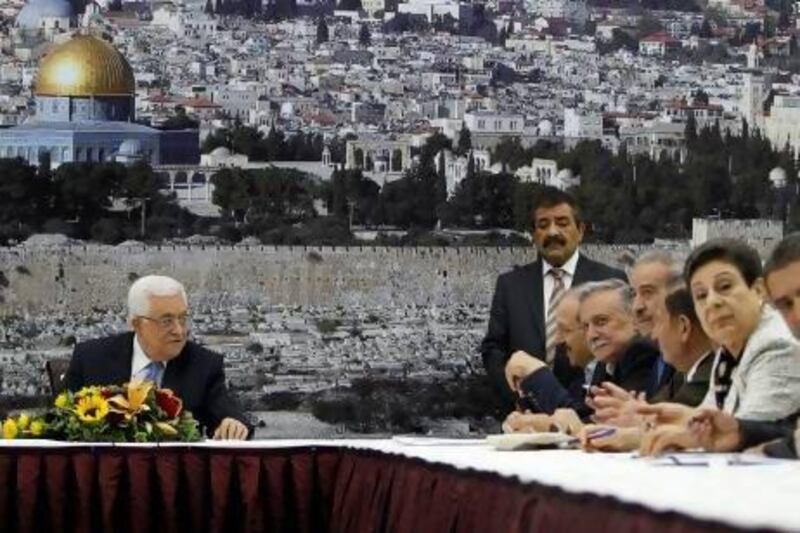RAMALLAH // A US-sponsored initiative to push the Palestinians and Israelis back to the negotiating table appeared near a conclusion late last night, as each side scrambled to set forth its terms for a resumption of talks.
The quickening pace of diplomacy comes one day after the Arab League endorsed efforts by US secretary of state John Kerry to restart the talks after a lull of nearly three years.
Top Palestinian officials gathered in a special session in Ramallah yesterday to decide whether to accept Mr Kerry's formula for reviving the peace process. No decision to return to talks emerged from that meeting, which was headed by Mahmoud Abbas, president of the Palestinian Authority.
Members of the powerful Fatah faction that Mr Abbas chairs were unhappy with the details of Mr Kerry's proposal. They demanded changes that included using the boundaries that prevailed before the 1967 Arab-Israeli war as a basis for negotiations, which Israel refuses.
"Fatah wants to make some alterations to Kerry's plan," said one senior Fatah official, "because the proposed ideas are not encouraging for a return to negotiations."
Qais Abdel Karim, an official with the Palestine Liberation Organization (PLO), said late yesterday that a committee had been appointed to consider the plan further and was expected to reach a decision today.
In another indication of a possible breakthrough, Mr Kerry, who is on his sixth visit to the region since February, postponed his scheduled departure yesterday evening from the Jordanian capital because of "additional work that requires his presence" there, a US State Department official said.
America's top diplomat on Wednesday received key backing for his efforts from the Arab League, which at his request reiterated its offer of normalised relations with Israel, set forth in the 2002 Arab Peace Initiative.
Israel has never formally responded to that offer, which was sweetened in April to allow Israel to keep some settlements in exchange for swapping its own territory with a Palestinian state.
Mr Kerry is not scheduled to visit Israel, raising speculation that he may already have reached an understanding with Israel's prime minister, Benjamin Netanyahu, to return to talks.
Officials in the Israeli leader's office denied news reports yesterday that he had accepted the longstanding Palestinian demand of negotiating on the borders that existed before the 1967 war, during which Israel seized the West Bank, Gaza Strip and East Jerusalem, territories wanted for a Palestinian state.
But there were uncontested indications of conciliatory gestures made by Israel in an attempt to ease the way towards a resumption of talks. Israel's Army Radio reported that the military was preparing to lift some restrictions on Palestinian movement in the West Bank.
"It appears that in the next few days the future of negotiations between Israel and the Palestinians will be determined," said Army Radio.
Also, Israel's president, Shimon Peres, urged European Union (EU) officials yesterday not publish the 28-member bloc's new guidelines against Israeli settlements. He asked the EU to "give priority to peace" and cautioned that the new guidelines - which caused consternation and anger among Israeli leaders - could sabotage the possibility of renewed negotiations.
"The coming days will be critical, but we are within reach" of renewed Israeli-Palestinian talks, Mr Peres said.
Palestinian officials say Mr Kerry has exerted serious pressure on Mr Abbas to return to talks in the face of the Palestinian Authority president's insistence that Israel first halt construction of settler homes in East Jerusalem and the West Bank.
More than 500,000 Jewish settlers live on those territories, posing one of the most daunting obstacles to the creation of a Palestinian state.
One official in the Palestine Liberation Organisation (PLO), which Mr Abbas also heads, said the Palestinian leadership could be persuaded to join talks without a halt on settlement construction. But that would require conciliatory gestures from Israel, including a recognition of the 1967 boundaries as a basis for negotiations. Mr Netanyahu has repeatedly rejected that demand, arguing that those boundaries are "indefensible".
"There might be a return to talks without a freeze," said the PLO official, who cautioned that Mr Abbas and his closest aides were not "excited about going back to negotiations."
Some conciliatory measures reportedly broached between Mr Kerry and Abbas include a release of Palestinians held in Israeli prisoners. The PLO official, however, insisted that one of the foremost demands to returning to talks with Israel would likely be "a clear-cut time frame" for negotiations.
The Palestinian leadership feared getting bogged down into "endless" talks with the government of Mr Netanyahu, which is made up of pro-settler parties and ministers. Several prominent ministers have recently expressed their opposition to relinquishing the occupied territories and recognising a Palestinian state.
During that last round of peace talks, in late 2010, which collapsed because of Israeli-settlement construction, Palestinians said Mr Netanyahu was not serious. Among their complaints, they said, he refused to produce maps for negotiating a border between Israel and a Palestinian state.
hnaylor@thenational.ae
*Additional reporting from news agencies
twitter: For breaking news from the Gulf, the Middle East and around the globe follow The National World. Follow us





